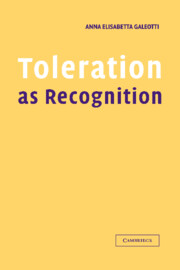Book contents
2 - The limits of liberal toleration
Published online by Cambridge University Press: 22 September 2009
Summary
CRITICISMS OF LIBERAL NEUTRALITY
So far, the political conception of toleration framed in terms of the neutralist interpretation appears more encompassing than that provided by perfectionism, while avoiding its moralistic flavor. Nevertheless, being intrinsically linked to the notion of state neutrality, it is open to the many attacks brought against this concept, first by communitarians, but also by perfectionists and, more recently, by the supporters of multiculturalism. Though many of these criticisms are important and worth serious consideration, I will argue that they are by no means conclusive, and can be convincingly answered by neutralists. What I hold to be the real problem with the neutralist model, on the other hand, is touched on only tangentially by its critics.
The most common objections to liberal neutrality raised by its communitarian and perfectionist critics concern, first, its literal meaning and, second, its justification. Such critics question the very possibility of plausible and coherent interpretation of neutrality. Critics of neutrality ask what it actually means to be neutral: does it, for example, imply not favoring any party at all, or favoring all equally? And neutral about what? Issues such as killing or rape or slavery are, for instance, excluded by neutralists, who would favor, in these instances, state coercion. How should polygamy or clitoridectomy be considered by neutralists? And how can neutrality represent a value, instead of beinga mere modus vivendi?
- Type
- Chapter
- Information
- Toleration as Recognition , pp. 53 - 84Publisher: Cambridge University PressPrint publication year: 2002



